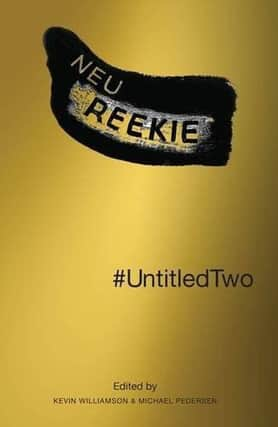Book review: Neu Reekie #Untitled Two


Neu Reekie #Untitled Two, edited by Kevin Williamson and Michael Pedersen | Polygon, 112pp, £12.99
In 1999, the first modern Scots Makar, Edwin Morgan, had this to say about Scotland and poetry: “As a member of the universe, Scotland does seem to be twinkling, however faintly. It is my place, and I shall continue to write about it as occasion arises. Its fate, as an entity, haunts me, and will not haunt me the less if I stand on a hill in Glasgow and look up on a clear night at a dash of stars”. Morgan understood that to be of a place is as meaningless as it is meaningful. Poetry offers its reader a conversation with politics, history and culture that is not confined to prosaic and national definitions of the same. Nearly 20 years later, Scotland might still locate itself beyond its own contemporary rhetoric and figures of discourse whilst remaining acutely aware of them. Scotland’s fate, shared by the depth and breadth of humankind, finds its questioning, “twinkling” potential in poetry. This might be radical and political. But it might also be delicate and half-formed, like, in this latest collection from cultural phenomenon Neu Reekie, Kathleen Jamie’s “Shrew”: a timorous beastie “spindrift on her midget fur, / caught mid-thought, mid-dash”.
Advertisement
Hide AdNeu Reekie burst onto the cultural scene, in Edinburgh (then later Glasgow and the Highlands) in 2010, but can trace its intellectual heft back to the Scottish counterculture of the 1970s. Co-editor of this collection, Kevin Williamson, founded radical literary magazine Rebel Inc alongside Sandie Craigie in 1992. They published early work by Irvine Welsh, and, after being taken under the wing of Canongate, reissued work by Glaswegian Alexander Trocchi under the imprint Rebel Inc Classics. Rebel Inc’s appreciation of Trocchi’s work and others from the anti-movements of the late 20th century was crucial to Williamson’s notorious ethos: ‘“F*** the mainstream!” This countercultural heritage forms the impetus for Neu Reekie’s public attitude: Williamson and poet Michael Pedersen have curated a popular series of cultural events that focus on performed poetry, film, filmpoetry, music and aesthetic events that fall between all these camps. Up-and-coming poets have been quickly joined by more established names, and in one of her most laudable decisions during her generous-minded tenure as Makar, Neu Reekie received the full-hearted support of Liz Lochhead.
#UntitledTwo, their second collection, builds on the cultural capital of the first (out last year), and includes a raft of poets working on both sides of Scotland’s borders: new work from the new Makar, Jackie Kay, Alan Bissett, Ciaran Carson, and Rachel McCrum (BBC Scotland’s Poet-in-Residence), amongst many others. Williamson suggests that “trying to hype up poetry doesn’t work. It [poetry] resists hype and thrives elsewhere. It thrives between the cracks of language”. This collection converses so successfully with its political surroundings precisely because it exists inharmoniously with itself. It is a place where Sandie Craigie can “bleed in Scots / Dream in colour / Write in black and white / …weep in Scots”; where, indeed, a poem finds versions of itself in Scots and English, by Sophie Cooke; but where Patience Agbabi’s “Thames sunk the promenade / that night”, and Helen Mort’s “diet is the South Yorkshire Coalfields diet”. Scotland bleeds out of geography to an untrammelled sense of itself – it is multilingual, multiracial, at odds with the authority of gender: “my tits are more feminist than your tits”, teases Salena Godden. Jackie Kay’s ironic assertion, that “we closed the borders, folks, we nailed it”, becomes a sharp call for openness and inclusivity, and the recycling of historical rhetoric is witnessed by Colin Will’s poetic voice “who has never watched Braveheart, nor ever will”. A vision of being from a place, then, that suffers the anxiety and discomfort of its presence, whilst simultaneously tracing the strange beauty of it as it slips away. These untitled, “spindrift” failures – of Scotland, of us all – call out faintly in this collection, and feel reparative.
• Andrew F Giles is a writer and translator, currently researching the Spanish poet Leopoldo María Panero at the University of Bristol. His forthcoming article for the Journal of Iberian & Latin American Studies offers a radical rethink of the way we consider the authority of critical theory and the New Left. He will be appearing at various festivals and conferences in the UK later in the year, and tweets at @andrewfgiles2